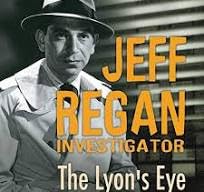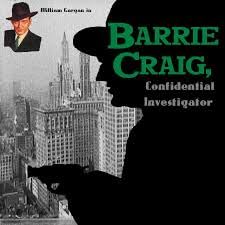eff Regan, Investigator Singles
by Old Time Radio Researchers
Topics OTRR Jeff Regan Item Size 1.4G
Episodes from the OTRR Maintained set of Jeff Regan, Investigator:
JEFF REGAN, INVESTIGATOR
Jeff Regan, Investigator, was one of countless private detective series that proliferated in the years following WWII. The series initially featured Jack Webb in the title role, who was coming off his work in Pat Novak for Hire, followed by Johnny Madero, Pier 23. The series premiered July 10, 1948, over the CBS network. Originally promoted as Joe Canto, Private Eye, the series was never actually broadcast under that name. However, Barton Yarborough, Jack Webb's first partner in Dragnet, would make a guest appearance in the show playing a bit part named Joe Canto. The series was sometimes incorrectly called The Lyon's Eye by collectors because Regan frequently opened each show stating "I'm Jeff Regan. They call me The Lyon's Eye" or something similar.
The first run of Jeff Regan ran from July 10 to December 18, 1948. Webb continued to play a hard-boiled character as in previous roles, but this time with a better relationship with the police. Webb left the show after 24 episodes when CBS declined his request for a $15 per episode raise. He returned for a brief run on a revived Pat Novak for Hire before premiering on his signature program, Dragnet, in June 1949.
After 10 months, Jeff Regan was brought back to the air on October 5, 1949. After auditioning some 60 top actors for the role, Frank Graham was selected to play Regan. Regan's boss Anthony J. Lyon had been voiced by Wilms Herbert and then Herb Butterfield during the Jack Webb era. The 1949 revival cast Frank Nelson as Lyon. Nelson was best known as the sarcastic character who would pop up almost anywhere on The Jack Benny Show.
Paul Dubov assumed the Jeff Regan mantle during a part of the program's run. For eight weeks between April and June 1950 he stepped in to replace an ailing Frank Graham. Frank Graham's return as Jeff Regan lasted just a couple months, with the last episodes being recorded on August 2, 1950 for broadcast later. However, the program ended after Graham's tragic death at the age of 35 on September 2, 1950. The final episode of Jeff Regan, Investigator titled "The British are Coming" aired the following day, September 3, 1950.
Bob Stevenson was the primary announcer for the show. Del Castillo, Dick Aurandt, and Milton Charles were responsible for the music. Although there was indication to take it to a national audience, the show never aired beyond CBS' West Coast network.
Jeff Regan, Investigator holds up as an above-average example of the mid-century detective genre. This is due to the considerable talent invested in the program which included the voice talents of Jack Webb, Herb Butterfield, and Frank Nelson as well as the writing skills of E. Jack Neuman, who created the program, Larry Roman, William Froug and William Fifield. Some of his stories were good enough that E. Jack Neuman would re-use many of the Jeff Regan scripts when he worked on other series.
This synopsis was written by Patrick Andre and Ryan Ellett with information taken from John Dunning's Encyclopedia of Old Time Radio, The Great Detectives of Old Time Radio website, Jay Hickerson's Ultimate History of Network Radio Programming, and "The Secret Files of Jeff Regan, Investigator" by Stewart Wright, published in Radiogram, June 2019.
 1 hr and 50 mins
1 hr and 50 mins Dec 14 202558 mins
Dec 14 202558 mins Dec 13 202556 mins
Dec 13 202556 mins 55 mins
55 mins 59 mins
59 mins 1 hr and 27 mins
1 hr and 27 mins 59 mins
59 mins 54 mins
54 mins
